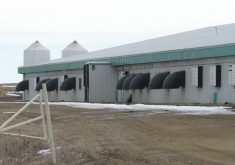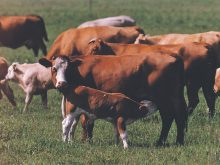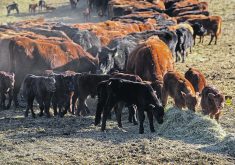An Alberta company introduced Alfasure in 2003 to combat alfalfa bloat in cattle. Since then, producers have been able to reap the performance benefits of alfalfa feed without worrying about frothy bloat.
Bloat is a difficult condition to manage because so many factors trigger its onset. Under normal conditions, nerve receptors in the rumen detect the free gas that comes from fermentation. In response to this buildup, the esophagus is stimulated to open and release the gas through burping.
Read Also

Budget seen as fairly solid, but worrying cracks appear
The reaction from the agriculture industry to prime minister Mark Carney’s first budget handed down November 4th has been largely positive.
Alfalfa is often to blame for bloating because proteins from the plant allow gas from forage fermentation to collect as a sea of bubbles at the top of the rumen. The protein acts like soap added to water when washing dishes.
Gas trapped in this bubbly foam cannot stimulate the burping reflex and it collects in the rumen. An animal may go off its feed if even just a little foam is trapped; rapid accumulation of gas in more severe cases can cause death.
The proteins responsible for creating frothy bloat are found in legumes, especially alfalfa, but they are also present in cereals and most lush, rapidly growing forages. The more immature the plant, the greater the chance it can induce frothy bloat.
Alfasure is a nonionic surfactant that reduces the stability of the foam. When added to cattle’s drinking water, it works like the anti-foaming agents that are added to hot tubs to eliminate foam buildup. When the foam bubbles in the rumen burst, the released gas collects as free gas, which stimulates a normal burping reflex.
University of Calgary researcher Merle Olson says it is impossible to induce frothy bloat in cattle on Alfasure, which was recently verified by a study at Agriculture Canada’s research unit in Kamloops, B.C. Untreated cattle bloated 98 out of 256 animal days while cattle treated with Alfasure did not bloat.
Alfasure costs 18 cents a head per day for animals less than 1,000 pounds and 25 cents for cattle heavier than that. The cost is less than $30 per head over a 120-day grazing season and the direct benefits are numerous.
Producers whose cattle are on alfalfa pasture can boost stocking density by as much as 30 percent compared to regular grass pasture.
Animals on alfalfa pasture also gain weight up to 20 percent faster. These excellent gains usually come with a price: mortality rates from bloat can be as high as 10 percent in cattle pastured on alfalfa. Alfasure avoids this complication.
Cattle on Alfasure can eat more legumes so they need less grain. The result is lower input costs. Time to market can be reduced by as much as one month compared to feeding grass forage. Alfasure also gives producers the option of finishing cattle on pasture rather than in feedlots.
Another advantage with alfalfa is that it can be harvested in summer as a hay crop and cattle can then graze on the regrowth. Alfalfa pastures are higher in quality than grass pastures in late summer.
Because every animal must receive a daily dose of Alfasure, there can be only one water source on each pasture. Cattle losses during product testing were always traced back to access to untreated water sources.
Alfasure is not only a preventive; it can also treat frothy bloat from any cause, not just alfalfa. A dose of 30 millilitres is mixed with water and delivered by stomach tube, drench or direct injection into the rumen. Bloat is alleviated in approximately 20 minutes.
A side benefit of Alfasure is that it can help reduce greenhouse gas emissions. Slaughtering cattle sooner means they have less time to produce methane. As well, alfalfa is more digestible than many other types of forage so less greenhouse gas is produced. Additional studies are under way to better define these benefits.














